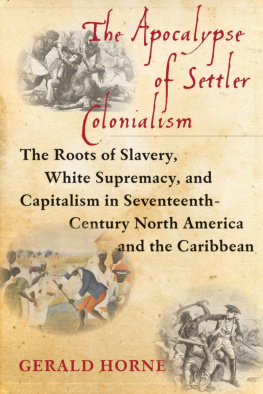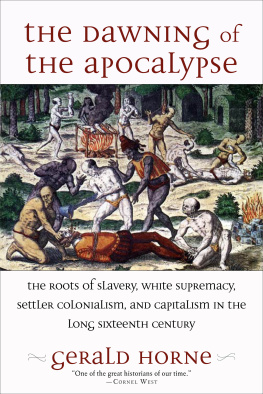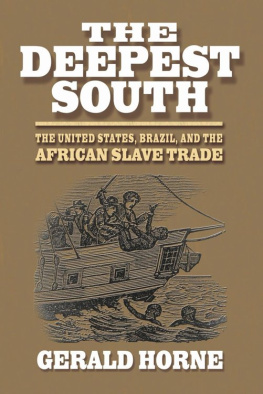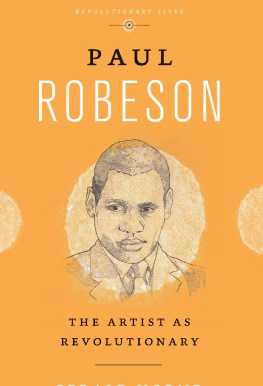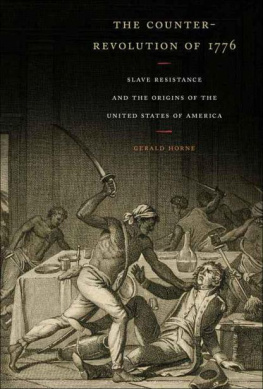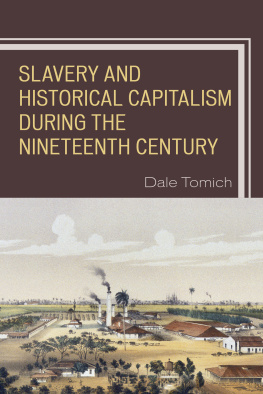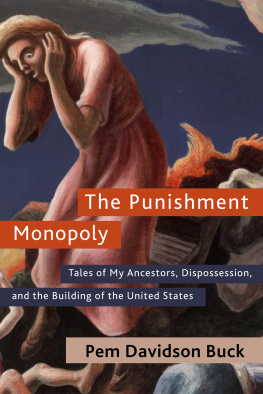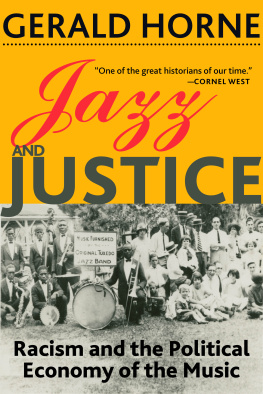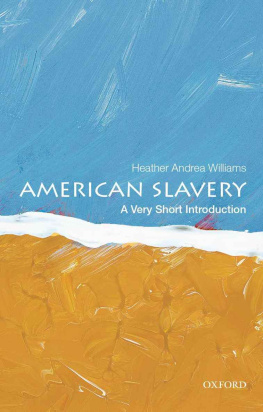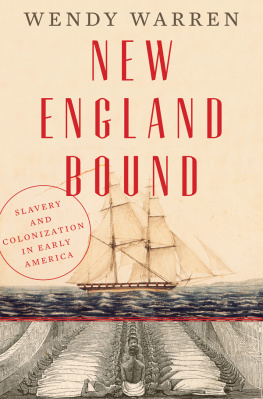The Apocalypse of Settler Colonialism
The Apocalypse of Settler Colonialism
The Roots of Slavery, White Supremacy, and Capitalism in Seventeenth-Century North America and the Caribbean
by GERALD HORNE

MONTHLY REVIEW PRESS
New York
Copyright 2017 by Gerald Horne
All Rights Reserved
Library of Congress Cataloging-in-Publication Data
available from the publisher.
ISBN: 978-1-58367-663-9 (paper)
ISBN: 978-1-58367-664-6 (cloth)
Typeset in Eldorado
Monthly Review Press, New York
monthlyreview.org
5 4 3 2 1
Contents
Introduction
T he years between 1603 and 1714 were perhaps the most decisive in English history. At the onset of the seventeenth century, the sceptered isle was a second-class power but the Great Britain that emerged by the beginning of the eighteenth century was, in many ways, the planets reigning superpower.
There are many reasons for this stunning turnabout. Yet any explanation that elides slavery, colonialism, and the shards of an emerging capitalism, along with their handmaidenwhite supremacyis deficient in explanatory power. From the sixteenth through the nineteenth centuries nearly 13 million Africans were brutally snatched from their homelands, enslaved, and forced to toil for the greater good of European and Euro-American powers, London not least. Roughly two to four million Native Americans also were enslaved and traded by European settlers in the Americas, English and Scots not least.
From the advent of Columbus to the end of the nineteenth century, it is possible that five million indigenous Americans were enslaved. This form of slavery coexisted roughly with enslavement of Africans, leading to a catastrophic decline in the population of indigenes. In
The United States is the inheritor of the munificent crimes of not only London but Madrid, too. When Hernando De Soto crossed what became known as the Mississippi River in the 1530s, he had in tow enslaved indigenes, as he helped to clear the land for what became the futures comfortable U.S. suburbs.
Though disease spread by these interlopers is often trotted out to explain the spectacular downturn in the fortunes of indigenous Americans, genocide
But within that broad expanse of centuries, it is the seventeenth that stands out conspicuously as the takeoff for Londons involvement in the nasty business of enslavement, which simultaneously delivered bounteous profits that set the stage for a racializing rationalization of inhumanity, while setting yet another stage for the takeoff of an enhanced capitalism. A recent study revealed that before 1581 there were no enslaved Africans brought to what was referred to as the British Caribbean and Mainland North America. From 1581 to 1640 there were scores brought to each. But from 1641 to 1700, 15,000 Africans were brought to North America and 308, 000 to the British Caribbean.them from West Central Africa and most of the rest from the states abutting todays Ghana and the Bights of Benin and Biafra.
What is euphemistically referred to as modernity is marked with the indelible stain of what might be termed the Three Horsemen of the Apocalypse: Slavery, White Supremacy, and Capitalism, with the bloody process of human bondage being the driving and animating force of this abject horror. Decades ago, the Guyanese scholar Walter Rodney sketched adroitly How Europe Underdeveloped Africa and, correspondingly, how Western Europe was buoyed by dint of ravaging this beleaguered continent. The slave trade left the infirm and elderly behindand took the rest. Systems of agriculture, mining, production of metal, cotton, wood, straw, clay and leather goods, trade, transport, and governance that had evolved over centuries were wounded severely. Community was turned against community, neighbor against neighbor. Simultaneously, the agents of this apocalypse profited handsomely.
London was a prime beneficiary of this systemic cruelty. England had a 33 percent share of the slave trade in 1673 and 74 percent by 1683. Of that dreadful total, the Royal African Company, under the thumb of the Crown, held a hefty 90 percent share in 1690, but with deregulation and the entrance into this sinfully profitable market by freelance merchants, this total had shrunk to 8 percent by 1701. This political and economic victory over monarchy by merchants also undergirded the popular politics they represented, which eventuated in a republicanism that scored its paradigmatic triumph in 1776. As scholar William Pettigrew has argued forcefully, the African Slave Trade rested at the heart of what is still held dear in capitalist societies: free trade, anti-monarchism, and a racially sharpened and class-based democracy.
However, the surging merchants so essential to the fomenting of the so-called Glorious Revolution in 1688, which was a kind of Magna Carta for racialized bourgeois democracy, contained aching
Similarly, as the religious conflicts that animated the seventeenth century began to recedeChristian vs. Muslim; Catholic vs. Protestantas the filthy wealth generated by slavery and dispossession accelerated, capitalism and profit became the new god, with its curia in the basilicas of Wall Street. This new religion had its own doctrine and theologies, with the logic of the market and its efficient market theory supplanting papal infallibility as the new North Star.
Actually, reducing the present to capitalism is somewhat misleading since todays status quo represents a complex mlange of vestiges of slaverythe still exploited African population in the United States and elsewherecapitalism, and the feudalism from which it emerged.
Moreover, underdevelopment, particularly in Africa, is not only a product of the depopulation of the halest and heartiest delivered
Like a seesaw, as London rose Africa and the Americas fell. As one scholar put it, the industrial revolution in England and the cotton plantation in the South were part of the same set of facts. The enslaved, a peculiar form of capital encased in labor, represented simultaneously the barbarism of the emerging capitalism, along with its productive force.
The continent that was compelled to contribute to this process (those now known as African-American) arguably has yet to recover from the slave trade and the concomitant colonialism that accelerated in the seventeenth century, which in turn has marked this population wickedly with the stain of slavery. Surely, if one seeks to understand how and why it is that so many Africans reside in North America speaking a language with roots in Western Europe, an intimate understanding of the seventeenth century is a requisite.
ENSLAVED AFRICANS CONSTITUTED two-thirds of the total migration into the Americas between 1600 and 1700.
The continuing immiseration that gripped all too many in the British Isles was also a recruiting broadside, magnetically conscripting young menand some disguised young womento join the military and wield these weapons against others. The English succeeded as colonizers, says one historian, largely because their society was less successful at keeping people content at home. The wealth generated, in a circle devoid of virtue, allowed for the creation of standing armies that could then compel multiplication of the wealth accumulating in Englands coffers, extracted from Africa and the Americas.
It was during the 1600s, driven by seemingly unceasing conflicts between and among them, that European powers developed not just muskets but also countermarch drilling, whereby the front row of gunners fire off their charges, then march to the back of the formation in order to reload. An island monarchy, England had a felt need to develop a formidable navy, which included broadside ships with multiple tiers of cannon and capacity to sail close to the wind. Another innovation that guaranteed rising European power was the building
Next page
